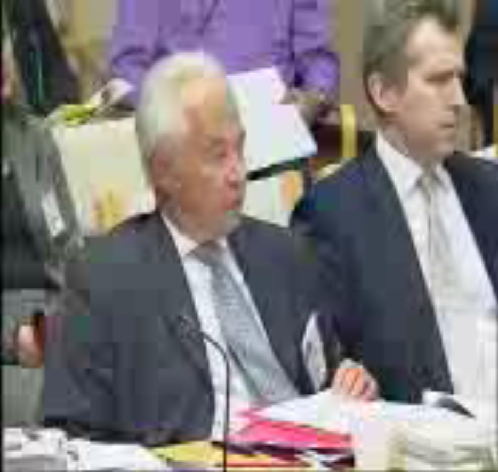ABA Chairman David Flint has appeared before a Senate Estimates Committee hearing in Canberra, tabling the previously released letter to Alan Jones and a second letter.
David Flint also spoke of the third letter, dated April 2000, which he did not table, prompting this exchange:
Senator MACKAY—The correspondence that you referred to also asked you to bring along some letters
between you and Mr Jones which have received publicity recently. Have you got those with you?
Prof. Flint—There are two letters of relevance. One is the letter of 11 June 1999, which has been widely
published. There was an earlier letter, which I will provide to the Senate. That was dated 28 September 1997.
It conveyed a copy of the speech which I had given to a media law conference. Those seem to be the only
relevant letters which we have been able to find.
Senator MACKAY—What do you mean by ‘relevant’? In whose terms? Is that your definition of relevant?
Essentially, we asked you to produce all letters from you to Mr Jones that were written on ABA letterhead. Are
they the only two that were written on ABA letterhead?
Prof. Flint—I will take this on notice because there is another letter which it may or may not be appropriate
to give to you.
Senator MACKAY—That is really for us to judge. We have asked you to provide all correspondence on
ABA letterhead from you to Mr Jones. It is up to us to determine, I guess, whether it is relevant or not.
Prof. Flint—It was a request. I noted that. But I was, as you can see, surprised that you provided such a
press release. However, this other letter is being examined and if it can be released it will be released. I have
taken that on notice and I will be advised by our legal advisers as to what the status of that letter is.
Labor Senator, John Faulkner, asked him about disclosing conflicts of interest regarding his letters to Alan Jones.
The conversation centred on the concept of “apprehended bias,” ie, that Chairman Flint would be considered to be biased in his dealings with various radio enquiries.
Senator Faulkner put to Chairman Flint: “Your failure to make public your stream of correspondence was a serious omission.”
Flint said he “regretted overlooking the correspondence” saying he had forgotten. “There was a fault in my memory regarding the disclosure of the letter.”
Flint said he had declared all other contacts with broadcasters including Alan Jones, and explained that the current policy of co-regulation encourages close contact with broadcasters.
Not satisfied with the reply, Faulkner kept probing Flint about the propriety of the exchange of “fawning letters,” and whether it constituted a conflict of interest. Flint disagreed with the description “fawning” but did not object to the term “laudatory.”
Flint explained that normally ABA Board members are required to disclose conflicts of monetary interest, but that there was no policy on something such as letters.
Faulkner asked: “Doesn’t it seriously prejudice the enquiries and the integrity of the ABA?”
Referring to the recent enquiries into 2GB’s Alan Jones and 2UE’s John Laws, Flint replied: “The enquiry conducted by top silks…left no stone unturned… The process was in no way shonky, it was above board.”
Faulkner disagreed with Flint and said he was “condemned out of his own mouth.”
Democrat Senator, John Cherry, then changed tack and began asking about Chairman Flint’s bias in relation to sitting on the ABC Complaints enquiry. Once again, Flint rejected any suggestion of bias in relation to the ABC.
Senators Cherry and Faulkner probed Flint’s pro-Liberal “published views,” suggesting that he favoured Senator Alston’s position against the ABC.
Questioning then turned to the draft report on the 2GB Macquarie-Telstra investigation which was leaked to ABC TV’s Media Watch. Probing centred on the status of the draft document with a view to finding out when that draft was changed and whether ABA Chairman Flint had influenced those changes.
ABA Chairman Flint did not immediately answer a question about whether there were other complaints which he had influenced, prefering that the question be placed on notice and answered later so he could check his facts.
Discussion also centred on a number of live reads in the Alan Jones program and how listeners perceive live reads, advertising content and political advertising.
At one stage, Faulkner put it to Flint that his work is compromised because he should not be involved in enquiries into 2GB, 2UE, the ABC, channel 9 and other broadcasters. Flint rejected the implication that he is compromised and “a lame duck regulator.”
Liberal Senator Kemp accused Senator Faulkner of “intimidating” David Flint at one stage of the proceedings.

